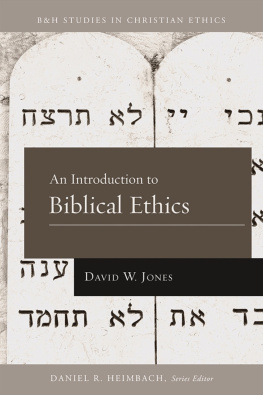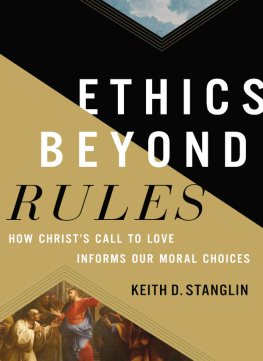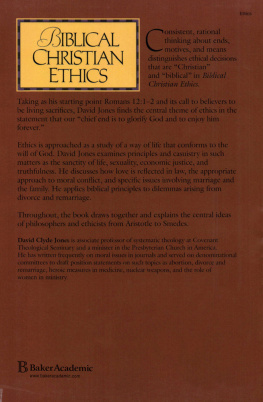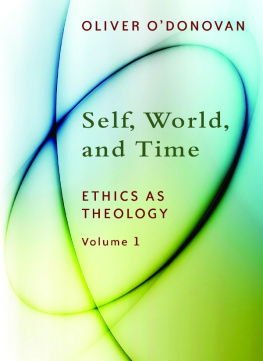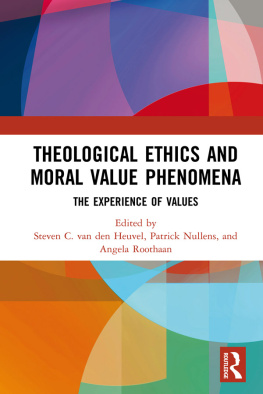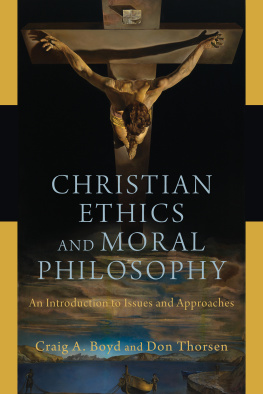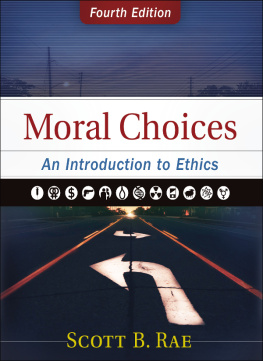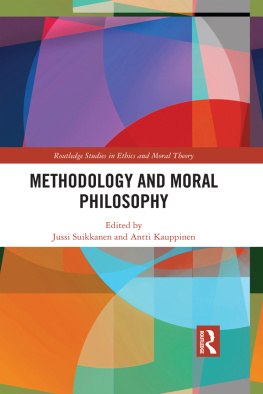I believe this will become the standard in the field of biblical ethics. It is clear, concise, and eminently readable. We have long needed a book like this, and now we have it. Thank you Dr. Jones!
Daniel L. Akin
President, Southeastern Baptist Theological Seminary
David W. Jones has written a well-informed, readable, and practical introduction to the study of Christian ethics. For every important ethical topic, he carefully documents and summarizes a number of different Christian views and then argues graciously and effectively for the position he favors. He constantly returns to Scripture as his ultimate standard and makes many practical applications to ordinary life. Readers will find this to be an excellent introduction to biblical ethics for many years to come.
Wayne Grudem
Research professor of Theology and Biblical Studies, Phoenix Seminary
It is always a joy to see books that tackle the issue of ethics in our day, but that also deliberately approach the topic from a biblical standpoint. Therefore, it is my privilege to commend to you this volume. May it enjoy the success it deserves, for there are too few who have had the courage to use the Scriptures in confronting such hard ethical questions in our times.
Walter C. Kaiser Jr.
President emeritus, Gordon-Conwell Theological Seminary
David W. Jones is a distinctive evangelical scholar, anointed with biblical wisdom and gospel passion. This book will teach, rebuke, and encourage, and it will provoke conversations that will linger long after the last page is turned.
Russell D. Moore, Ph.D.
President, SBC Ethics & Religious Liberty Commission
B&H Studies in Biblical Ethics
Volumes Available
Taking Christian Moral Thought Seriously edited by Jeremy A. Evans
Moral Apologetics for Contemporary Christians by Mark Coppenger
An Introduction to Biblical Ethics by David W. Jones
Forthcoming Volumes
Christian Bioethics by C. Ben Mitchell and D. Joy Riley
Basic Christian Ethics by Daniel R. Heimbach
An Introduction to Biblical Ethics, Digital Edition
Based on Print Edition
An Introduction to Biblical Ethics
Copyright 2013 David W. Jones
B&H Publishing Group
Nashville, Tennessee
All rights reserved
ISBN: 978-1-4336-6969-9
Dewey Decimal Classification: 241
Subject Heading: BIBLEETHICS \ CHRISTIAN ETHICS \CHRISTIAN LIFE
Unless otherwise noted, Scripture quotations are taken from the Holman Christian Standard Bible Copyright 1999, 2000, 2002, 2003, 2009 by Holman Bible. Publishers. Used by permission.
Scripture quotations marked ESV are from The Holy Bible, English Standard Version, copyright 2001 by Crossway Bibles, a division of Good News Publishers. Used by permission. All rights reserved.
Scripture quotations marked KJV are from the King James Version of the Bible.
Scripture quotations marked NASB are from the New American Standard Bible. The Lockman Foundation, 1960, 1962, 1963, 1968, 1971, 1972 , 1973, 1975, 1977.
Used by permission.
Scripture citations marked NKJV are from The New King James Version, copyright 1979, 1980, 1982, Thomas Nelson, Inc., Publishers.
For Johnathan, Laura, Alison, Madeline,
and Kimberly, with hope (Prov 22:6
Series Preface
T he greatest challenge to the life and witness of the church in our age is widespread moral confusion and denial of moral authority. This condition has been greatly influenced by a number of factors, including postmodern denial of objective truth, secularization of common life, pluralization of worldviews, and privatization of religionall accompanied by growing hostility toward anything Christian. In fact, claims of objective moral authority and understanding are openly contested by our culture more than any other aspects of Christian faith and witness. Those who are redefining justice, character, and truth are working hard to deconstruct essential social institutions to justify a variety of ends: pursuing sensuality, elevating lifestyle over protecting innocent human life, stealing what others have fairly acquired, ridiculing the rule of law, abandoning the needy for self-fulfillment, and forsaking lifelong commitments. They reject the Judeo-Christian values on which the institutions of Western civilization were erected (i.e., marriage, property ownership, free-market enterprise, justice, law, education, and national security) and without which they cannot endure. Never in the history of the church has there been a more critical need for scholarship, instruction, and application of Christian ethics in ways that equip Christian men and women to engage the surrounding culture in prophetic moral witness.
This series aims to promote understanding and respect for the reality and relevance of Gods moral truthwhat Francis Schaeffer called true truthin contrast to truth claims that are false or distorted. We hope these books will serve as a resource for Christians to resist compromise and to contend with the moral war raging through our culture and tormenting the church. Some authors in this series will address the interpretation of biblical teachings; others will focus on the history, theological integration, philosophical analysis, and application of Christian moral understanding. But all will use and apply Gods moral truth in ways that convince the mind, convict the heart, and consume the soul.
In An Introduction to Biblical Ethics , David W. Jones introduces readers to the field of biblical ethics. Readers may wonder how biblical ethics relates to Christian ethics. Are these different terms for one thing or terms for two different things? The answer is, they are different things that are closely connected. All worthy teaching of Christian ethics should be biblical in the sense of being faithful to biblical moral revelation, centered on biblical content, and compatible with biblical framing of reality and truth. But biblical ethics is distinct in that it focuses on exactly what the Bible says in matters of right or wrong moral action, good and bad moral character, and worthy or unworthy moral goals. So while Christian ethics includes biblical ethics, centers on biblical ethics, and builds on biblical ethics, the fields have different boundaries. As a field of study, biblical ethics is part of the larger field of Christian ethics; and Christian ethics is larger because it addresses philosophical thinking, theological doctrines, historical movements, and applying Gods moral standards to moral issues of the dayas well as what the Bible specifically says on moral matters.
This introduction to biblical ethics is bibliocentric, theocentric, and Christocentric. This means the author: (1) not only describes what the Bible says but treats what it says as authoritative, inerrant, relevant, and necessary; (2) not only accepts biblical teaching as a good way of doing things but as applying eternal, divine, moral laws to everyday life; and (3) not only embraces a theistic worldview but affirms the uniqueness of Christ as the way, the truth, and the lifenot only for Christians but for everyone everywhere.
While other books sometimes reduce biblical ethics to a version of human philosophy or just one of various humanly generated religious traditions, this text assumes and defends the view that biblical ethics is a matter of truth that cannot be reduced to humanly defined terms whether philosophical or religious. It is a matter of theology, not philosophy, and not just a matter of human speculation about theology but of true and reliable communication from the only God who exists. It comes from a source of truth and authority in a category to itself, one transcending all others including those defined by philosophical reason or arising from religious imagination. In other words this book treats biblical ethics as truth authoritatively and reliably revealed by the one true God for all humanity regarding the only standards that will matter at the end of time when each individual stands before the judgment seat of God.
Next page
